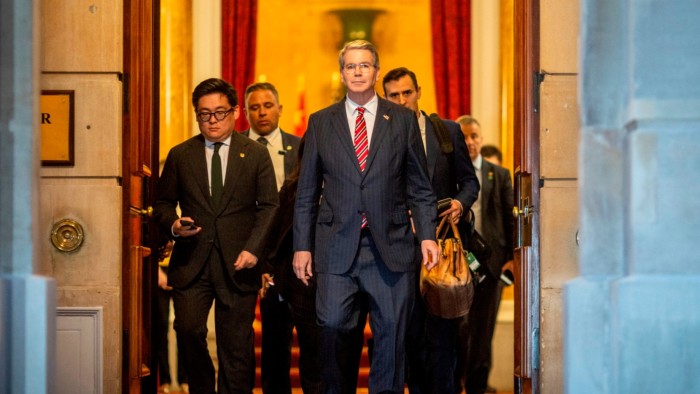Unlock the Editor’s Digest for free
Roula Khalaf, Editor of the FT, selects her favourite stories in this weekly newsletter.
American and Chinese officials were preparing for a possible third day of trade talks in London as US Treasury secretary Scott Bessent departed the city to return to Washington for an appearance before Congress on Wednesday.
Howard Lutnick, the commerce secretary who joined Bessent along with US trade representative Jamieson Greer for the negotiations, earlier told reporters that the talks were going well and could stretch into a third day.
“I hope they end this evening but, if they need be, we’ll be here tomorrow,” Lutnick said before an evening session, according to Reuters.
The US team has held two days of negotiations with He Lifeng, a Chinese vice-premier, and his delegation in an effort to resolve issues that have threatened to derail the ceasefire in the trade war that was agreed in a first round of talks last month in Geneva.
The marathon talks are being held in central London in the government-owned mansion of Lancaster House, a short walk from Buckingham Palace.
The historic venue, home also to the UK government’s 39,000-bottle wine cellar, was provided by the British government as neutral ground for the discussions between the two economic superpowers.
The talks have followed a call last week between US President Donald Trump and China’s President Xi Jinping.

The London meeting marked the first face-to-face talks between He and Bessent since a 90-day truce brokered on May 12 in Geneva, when they agreed to slash their respective tariffs on the other by 115 percentage points.
The high-stakes negotiations are an effort to ensure that two difficult issues — Chinese exports of rare earths to the US and American technology export controls on China — do not derail the broader talks.
Ahead of the first round of negotiations in Geneva, Bessent warned that the high tariffs each side had imposed on the other amounted to an embargo on bilateral trade. Underscoring the risks, Chinese exports to the US fell more steeply in May, year on year, than at any point since the pandemic in 2020.

While the US has accused China of not honouring its pledge from Geneva to ease restrictions on rare earths exports, Beijing has increased pressure on Washington to eliminate technology-related export controls. It was also angry that the US announced new restrictions after the Geneva meeting.
The US has accused China of foot-dragging over approvals of shipments of rare earths, which are critical to the defence, car and tech industries. The slow pace of approvals has affected manufacturing supply chains in the US and Europe.
Beijing has in turn accused Washington of “seriously violating” the Geneva agreement by issuing new warnings on using Huawei chips globally, halting sales of chip design software to Chinese companies and cancelling visas for students from the country.
On Monday, a senior White House official indicated that Trump could ease restrictions on selling chips to China if Beijing agreed to speed up the export of rare earths.
That would amount to a significant change of policy from the Biden administration, which implemented what it called a “small yard, high fence” approach designed to restrict Beijing’s ability to obtain US technology that could be used to help China’s military.



